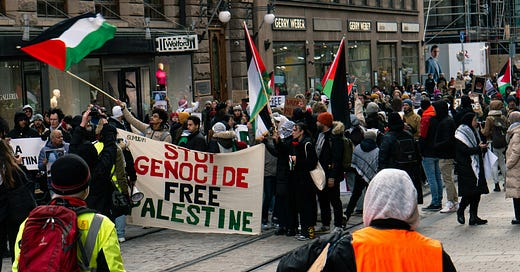When the Walls Shake: Faithful Resistance in a Time of Crisis
What Paul and Silas teach us about courage, compassion, and standing with the oppressed
Holy Covenant,
This Sunday I elected to preach on Acts 16:16–34 (CEB), a passage where we find Paul and Silas imprisoned. Not for breaking laws, but for disrupting a system built on exploitation. They liberate a young woman whose gifts are being exploited into profit for her owners. And instead of celebrating her freedom when it happens, the community responds with violence. Paul and Silas are stripped of their clothing, beaten, and thrown into prison. Why? Because they challenged an injustice that was happening and placed human dignity above the economy of the reigning empire.
This narrative mirrors our current global context, particularly the humanitarian crisis unfolding in Gaza. Today, we are witnessing a humanitarian catastrophe in Gaza. Nearly 500,000 people (nearly a quarter of the population) are at risk of famine, and over 65,000 children are suffering from acute malnutrition.12 The health system has collapsed, clean water is scarce, and their vital infrastructure lies in ruins.3 And yet, some governments and people in power are attempting to justify or minimize their suffering.
I imagine many are asking, “What does it mean to be followers of Jesus in a time like this?”
It means we listen to the cries of the suffering and hungry. It means we remember those the world would rather forget. It means we continue to raise our voices for the plight of the oppressed, contacting our legislators and representatives, even if it costs us comfort, life-long friends, and social standing.
In my sermon this Sunday, we’re going to see Paul and Silas do not simply wait for rescue. Even when chained, they sing, and they pray. And when the prison walls shake and the doors fly open, they do not flee. Instead, they stay. They see the jailer, who was once their oppressor, now as a fellow human being. Someone who was also imprisoned by the system and feared its retribution. And in an act of radical grace, these two offer him compassion.
This is what it means to follow Jesus: to sing and pray in the darkness, to remember the forgotten, and to continue to choose and act in compassion. Sometimes, it’s to stand among the rubble and refuse to look away, no matter how horrible things may be.
We must not ignore what is happening in Gaza. This is not about politics. This is about people. It’s about children who deserve food, families who deserve safety, a group of people that deserve dignity. As a church committed to justice, we are called to speak out, to pray boldly, and to advocate with our voices, our resources, and our actions.
I know the scale of suffering in Gaza feels overwhelming. But so did the prison walls in Acts 16 that held Paul and Silas. And yet, something holy stirred that day in the midst of great suffering and tragedy. When people act in love and faithfulness, the ground shakes, doors open, and things change.
Let us be people who act, not with violence or hatred, but with compassion, courage, and in loving-truth. Let us remember the forgotten, stand with the suffering, and cling to the hope that another more peaceful and just way is possible.
Join us this Sunday as we reflect together on how our faith calls us to respond in love and solidarity, even when it’s hard, even when the world tries to ignore or silence suffering.
Peace and Blessings,
Rev. Christopher Czarnecki
Holy Covenant UCC
Senior Pastor
Risk of famine across all of Gaza, new report says | World Food Programme
Over 65,000 Gaza Children Hospitalized for Severe Malnutrition amid Ongoing Israeli Blockade
Health system at breaking point as hostilities further intensify in Gaza, WHO warns



